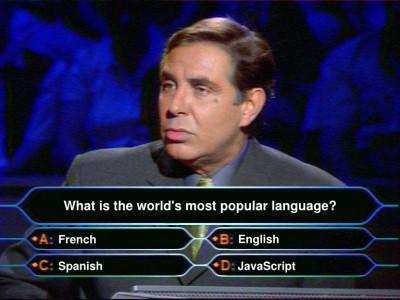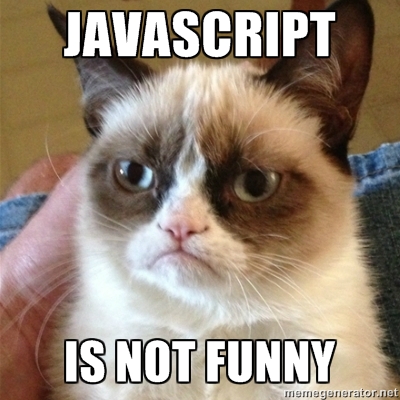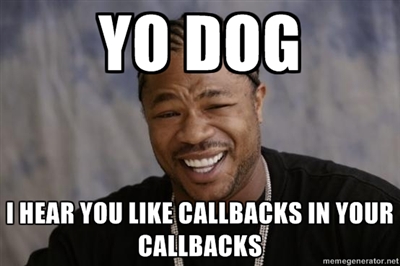
JavaScript So Easy
Even a Caveman Can Do It
Dan Shultz • OverDrive, Inc
JavaScript Easy?
Maybe it is hard...
...or just misunderstood.

Quiz

Whats the output of console.log?
> var foo = 1;
function bar() {
if (!foo) {
var foo = 10;
}
console.log(foo);
}
> bar();
10

// What you wrote
var foo = 1;
function bar() {
if (!foo) {
var foo = 10;
}
console.log(foo);
}
// What you really wrote
var foo = 1;
function bar() {
var foo;
if (!foo) {
foo = 10;
}
console.log(foo);
}

Understanding: scoping
Block Level Scoping
// c#
if(true) {
int foo = 15;
}
foo++; // compiler error
Function Level Scoping
only functions create a new scope*
> var foo = 1;
function bar() {
if (!foo) {
(function () {
var foo = 10;
})();
}
console.log(foo);
}
> bar();
1
Understanding: Hoisting
Variable Hoisting
function () {
foo();
var bar = "baz";
}
// is synonymous to above
function () {
var bar;
foo();
bar = "baz";
}
Function Hoisting
(function () {
foo(); // TypeError: undefined is not a function
bar(); // barrrr!
var foo = function () { console.log('foo!!!'); }
function bar () { console.log('barrrr!'); }
})();
Named Function Expressions
(function () {
foo(); // TypeError: undefined is not a function
bar(); // barrrr!
baz(); // TypeError: undefined is not a function
pony(); // ReferenceError: pony is not defined
var foo = function () { console.log('foo!!!'); }
function bar () { console.log('barrrr!'); }
var baz = function pony () { console.log('ride it!'); }
foo(); // foo!!!
bar(); // barrrr!
baz(); // ride it!
pony(); // ReferenceError: pony is not defined
})();
When scoping goes bad

Scoping Gone Bad
function f() { return 'global' }
function foo(x) {
var results = [];
results.push(f());
if (x) {
function f() { return 'local' }
results.push(f());
}
return results;
}
Scoping Gone Bad
//chrome 23.0.x
> foo(true);
["local", "local"]
> foo(false);
["local"]
Scoping Gone Bad
//firefox 16.x
> foo(true);
["global", "local"]
> foo(false);
["global"]
Scoping Gone Bad
// To avoid confusion and weird bugs...
// use var to declare functions
function foo() { ... }
function bar(x) {
var y = foo;
if(x) {
y = function () { ... }
}
y();
}
Understanding: Prototypes
"new" keyword
var Animal = function Animal(name, says) {
this.name = name;
this.says = says;
};
var cat = new Animal("fluffy", "meow");
Object.getPrototypeOf(cat); // cat.__proto__
Animal
"prototype" Property
Animal.prototype.speak = function speak() {
console.log(this.name, "says", this.says);
};
var cat = new Animal("fluffy", "meow");
> cat.speak();
fluffy says meow
Animal.prototype.move = function move() {
console.log(this.name, "walks");
}
> cat.move();
fluffy walks
Prototypes via Object.create
> var animal = Object.create(null);
> Object.getPrototypeOf(animal);
null
> var animal = Object.create(null);
> Object.getPrototypeOf(animal);
Object
Understanding: Function Invocations
Function.prototype.call (thisArg [ , arg1 [ , arg2, … ] ] )
Function.prototype.call
> function hello (world) {
console.log(this + ' says hello', world);
}
> hello.call("dan", "world");
dan says hello world
Function.prototype.call
function say () {
console.log('the', this.type, 'says', this.noise);
}
var cow = { type: 'cow', noise: 'moo' };
say.call(cow); // the cow says moo
cow.say = say;
cow.say(); // the cow says moo
Function.prototype.apply (thisArg, argArray)
Function.prototype.apply
> Math.min(1, 2, 3, 4, 5);
1
> Math.min.apply(Math, [1, 2, 3, 4, 5]);
1
Why This is Powerful
_slice = [].slice;
log = function () {
var args = _slice.call(arguments, 0);
if (this.logPrefix) {
args.unshift(this.logPrefix);
}
if (window.console && typeof console.log === 'function') {
console['log'].apply(console, args);
}
}
function.bind - controlling "this"
var animal = {
name: 'cow',
speak: function () { console.log(this.name, 'says moo'); }
};
var speaker = animal.speak;
speaker(); // undefined says moo
speaker = animal.speak.bind(animal);
speaker(); // cow says moo
function.bind - partial application
function buildUrl(protocol, domain, path) {
return protocol + "://" + domain + "/" + path;
}
// instead of this
var urls = paths.map(function (path) {
return buildUrl("http", "www.mydomain.com", path);
}
// use this
var urlBuilder = buildUrl.bind(null, "http", "www.mydomain.com");
var urls = paths.map(urlBuilder);
Handling the Async
Embrace Eventing
- Models Real Life Interactions
- Promotes Decoupling
- Abstracts Implementation
- Flexible
Callbacks...
...don't
Pyramid of Doom
(function($) {
$(function(){
$("button").click(function(e) {
$.get("/test.json", function(data, textStatus, jqXHR) {
$(".list").each(function() {
$(this).click(function(e) {
setTimeout(function() {
alert("Hello World!");
}, 1000);
});
});
});
});
});
})(jQuery);

Why no callback love
- Limits handling of event
- Awkward error handling
- Callback leaks through out your abstractions
- Lots of better, more flexible alternatives

FoodService.prototype.getLunch = function (order, callback) {
//.. go to the store
callback("here's your lunch");
}
// instead, maybe
FoodService.prototype.getLunch = function (order) {
//.. go to the store
this.trigger("hasFood", "here's your lunch");
}
...or return a promise
FoodService.prototype.getLunch = function getLunch(order) {
var deferred = this._getLunchPromise = $.Deferred();
//.. set off to do stuff and resolve/fail the promise later
return deferred.promise();
}
Promises
Promises
- Allow you to return a value or throw an exception without blocking
- Provides a proxy for a remote object to manage latency
- Mitigate Pyramid of Doom
Promises/A
then(fulfilledHandler, errorHandler, progressHandler)
Hows that help
step1(function (value1) {
step2(value1, function(value2) {
step3(value2, function(value3) {
step4(value3, function(value4) {
// Do something with value4
});
});
});
});
// With Promises
step1.
then(step2).
then(step3).
then(step4, orError); // notice onError at the end
Create a new promise with jQuery
function getPromise () {
var d = $.Deferred();
setTimeout(d.resolve, 100, "My Resolution);
return d.promise();
}
getPromise().
then(console.log) // print "My Resolution" after 100ms
jQuery Ajax
getBooks = -> $.ajax(url: "api.com/books")
getAuthors = (books) ->
# mapping function to match the authors to their
# respective books
mapAuthorsToBooks = (authors...) ->
books[i].authro = author[0] for author, i in authors
books
# map each book to a new ajax request
newPromises = books.map((b) -> $.ajax(b.authorUri))
# create a new promise with jQuery when
return $.when.apply($, newPromises).pipe(mapBooksToAuthors);
jQuery Ajax
getBooks.
then(getAuthors).
then(doStuff, handleError);
Even more eventing strategies
Global Event Bus
- Necessary to facilitate communication between multiple parts of system.
-
Think RabbitMQ, NServiceBus, etc
- Queueing
- Global Failures
- Routing
global.MyApp.GrandCentralDispatch
.on("cart.checkOutCompleted", LetMeKnow);
Proxy Events
class InboxController
constructor: (messages) ->
this._listController = new ListController(messages)
this._listController.on(
'item-selected', this._messageSelected
)
_messageSelected: (message)->
this.trigger('message-selected', message)
var inboxController = new InboxController(messages)
inboxController.on('message-selected', doSomething)
Protip: Namespace Events
button.on('click.my-name-space', onClickHandler);
// Easily unbind your click handlers without disturbing others
button.off('click.my-name-space');
Thanks - any questions?
Dan Shultz • OverDrive, Inc
@danshultz